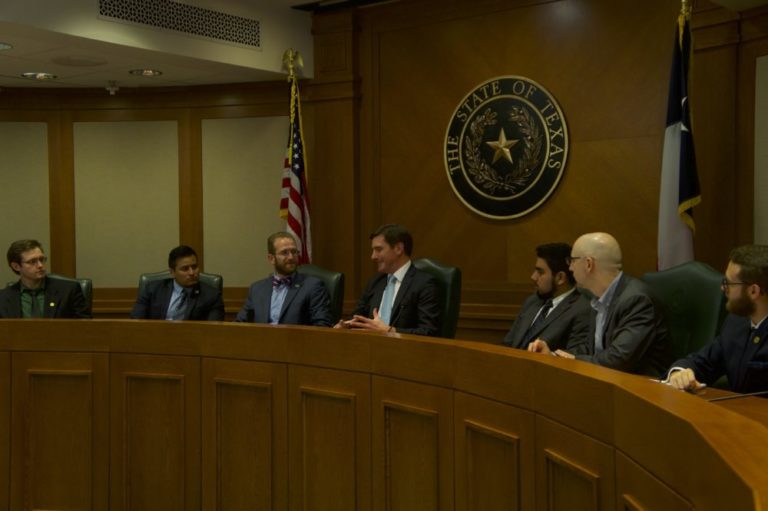
In April 2018, I joined nine other students at the Texas State Capital for the Texas Nuclear Engineering Student Delegation (TNESD). TNESD was founded in 2015 and inspired by the Washington NESD, a student-run organization of engineers from across the country who meet in Washington, D.C. to talk with legislators, policy makers, and representatives of the nuclear industry.
We made a state student delegation because a lot happens at the state and local level. The Nuclear Regulatory Commission, the federal regulator for civilian nuclear activities, has delegated a lot of authority to our state agency to monitor and regulate on its behalf. For example, the state legislature recently commissioned the Texas Compact Waste Facility, which is the only commercial operator in the U.S. that imports low level radioactive waste from any state. That facility moved from an idea, to a proposal, and ultimately to a legislated reality because of work at the state level.

Ryan Coogan.
Luckily for us, Texas has nuclear engineering students coming from Texas A&M and the University of Texas. This made it easier to create the delegation, and people were eager to meet with us. The power of being an engaged student in STEM really cannot be overstated. Legislators and other professionals love interacting with students, in part because we aren't there to sell them something or tell them how to do their job.
Our entire effort started with a series of phone calls and e-mails, and ultimately resulted in a daylong schedule that included policy makers, consultants, representation from our state agency, and even state representative Brooks Landgraf and state senator Kel Seiger.
Our meeting included four speakers, a Q&A session, lunch, and hour-long conversations with Representative Landgraf and Senator Seiger. We discussed the challenges of our industry, especially as it relates to politics and public buy-in. We also discussed the legislative process—taking an idea to sub-committee and into law. The intersection of science, policy, and law is not frequently studied in Fission 101, but it remains one of our biggest challenges in the nuclear industry.
Our state representatives were well informed on waste disposal and the nuclear industry in Texas. While our delegation spoke about technical issues of nuclear safety and security, our legislators were well informed on the politics, the process, and even the environmental impact on their district and the state. Ultimately, we learned as much from them about the process as they did from us about the science.
This exchange was the most remarkable part of my experience. It is easy to be cynical about politics today. However, the people we found at the capital are talented and purpose-driven, and they care deeply about making educated decisions. They were hungry to know more about us and our interests, and wanted to prepare us for the challenges where science and public policy meet. The political landscape can seem pretty bleak, but the people I met with were genuine, sincere, and educated. They might not align with my interests as a voter, but I found them very compelling and saw that they wanted to do good work for the state.

Robert Zedric.
I had two meaningful takeaways. The first is learning the soft skills that aren't taught in the engineering classroom. Having good people skills will open new doors and carry me far in life. Second is knowing that I can have an impact on my community beyond simply casting a vote each election. By getting out of my comfort zone and doing outreach, I know that I am capable of bringing attention to issues I care about to help accomplish positive change.
TNESD will continue to meet annually. Our next meeting is planned for April of 2019, when the Texas legislature will return to session. We are already looking forward to capitalizing on the opportunities cultivated this year, and we will continue to advocate for ourselves and for a sustainable nuclear industry. A single visit to the state capitol won't change the world, but it can start a dialogue and create connections that eventually grow into something remarkable.
Robert Zedric, a former organizer of the delegation, sent us some tips for readers interested in starting their own delegation:
Do you have a story to tell about your own local engagement or of someone you know? Please submit your idea here , and we will help you develop and share your story for our series.